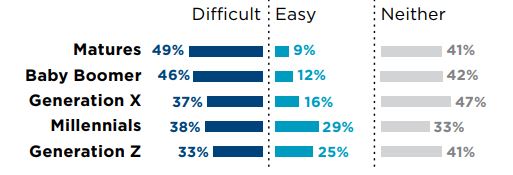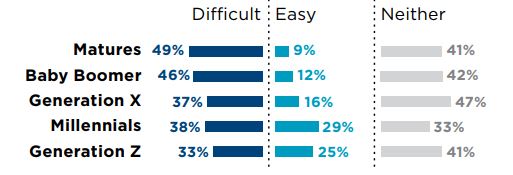As the holiday season is upon us, many will be opening up their hearts and wallets to various charitable organizations. Regular readers of this blog know that we frequently caution donors to be mindful of their contribution decisions and to check out charities before making a gift. Back in 2001, the BBB Wise Giving Alliance commissioned a detailed survey on donor attitudes (via phone interviews) and found about 7 out of 10 adults (70 percent) thought it was difficult to know whether a particular charity soliciting contributions was legitimate (i.e., actually did the good work they claimed to do and operated ethically.) As part of the Give.org Donor Trust Report conducted in the past year, we similarly asked donors (via an online panel) how easy or difficult it is to know whether a particular charity is trustworthy. This time, however, only 40 percent said it was difficult. What might have caused this dramatic improvement in the perceived ease in verifying trust in a charity?
There are a number of possible explanations for this improved comfort level. Some of it may be due to the rise in online sources of information, practically every charity has its own website. In addition, there has been improved access to the IRS Form 990 (the annual financial information form completed by charities), growth in the number of charity monitoring groups, more frequent educational outreach about charity fraud by U.S. federal and state government authorities and media attention about charities accused of significant missteps. All of this and more probably factors in to changes in the public’s perceived ability to verify trust in a charity.
On the other hand, there are generational differences in this issue. As outlined in the Give.org Donor Trust Report, 49 percent of matures (ages 72-89) believed that verifying trust in a charity is more difficult compared to just 38% of Millennials (ages 20-36) and 33% of Generation Z (ages 18 and 19.)

In our view, verifying charity trustworthiness takes effort, as demonstrated by the 20 BBB Standards for Charity Accountability which addresses charity governance, results reporting, finances, appeal accuracy, among other things. Nevertheless, we hope the thorough charity evaluations on Give.org contributes to strengthen the ability of contributors to make informed giving decisions.
Video of the Week
We are pleased to provide a video of the week that features an interview with Rebecca Bowen, Executive Vice President and Chief Advancement Officer with YMCA of the USA (a BBB Accredited Charity.) Ms. Bowen discusses donor trust and opportunities and barriers related to engaging younger donors.
Recent Reports
We are always working with charities to publish or update reports for donors. Visit Give.org or local BBBs to check out any charity before giving. Our recently evaluated charities include:
Finally, remember to let us know by going to give.org/charity-inquiry if you are interested in seeing a report on a charity not on the list and we will do our best to produce one.
H. Art Taylor, President & CEOBBB Wise Giving Alliance










